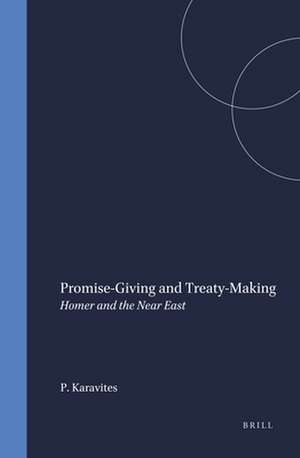Promise-Giving and Treaty-Making: Homer and the Near East: Mnemosyne, Supplements, cartea 119
Autor Peter Karavites Contribuţii de Thomas Wrenen Limba Engleză Hardback – 30 noi 1991
Most contemporary scholars maintain that the mighty Mycenaean period was almost completely separated from the Dark Ages and that virtually no evidence of the former remains, with the exception of the archeological finds and the meager testimony of the Linear B tablets. However, the Near Eastern evidence about treaties and other forms of promising suggests that the Iliad and Odyssey may indeed provide historical pictures of the Mycenaean times featured in their narratives.
Din seria Mnemosyne, Supplements
-
 Preț: 370.60 lei
Preț: 370.60 lei - 18%
 Preț: 735.03 lei
Preț: 735.03 lei - 18%
 Preț: 701.23 lei
Preț: 701.23 lei -
 Preț: 268.13 lei
Preț: 268.13 lei -
 Preț: 90.66 lei
Preț: 90.66 lei - 18%
 Preț: 584.00 lei
Preț: 584.00 lei -
 Preț: 169.79 lei
Preț: 169.79 lei -
 Preț: 216.33 lei
Preț: 216.33 lei - 18%
 Preț: 585.24 lei
Preț: 585.24 lei - 18%
 Preț: 581.90 lei
Preț: 581.90 lei - 18%
 Preț: 729.54 lei
Preț: 729.54 lei - 18%
 Preț: 657.49 lei
Preț: 657.49 lei - 15%
 Preț: 412.39 lei
Preț: 412.39 lei - 18%
 Preț: 708.10 lei
Preț: 708.10 lei -
 Preț: 270.75 lei
Preț: 270.75 lei - 18%
 Preț: 730.72 lei
Preț: 730.72 lei - 18%
 Preț: 733.05 lei
Preț: 733.05 lei - 18%
 Preț: 586.33 lei
Preț: 586.33 lei - 18%
 Preț: 731.87 lei
Preț: 731.87 lei - 18%
 Preț: 586.17 lei
Preț: 586.17 lei - 18%
 Preț: 1544.97 lei
Preț: 1544.97 lei - 18%
 Preț: 731.64 lei
Preț: 731.64 lei - 18%
 Preț: 732.02 lei
Preț: 732.02 lei - 18%
 Preț: 972.52 lei
Preț: 972.52 lei - 18%
 Preț: 585.94 lei
Preț: 585.94 lei -
 Preț: 380.60 lei
Preț: 380.60 lei - 18%
 Preț: 718.29 lei
Preț: 718.29 lei - 18%
 Preț: 732.20 lei
Preț: 732.20 lei - 18%
 Preț: 586.25 lei
Preț: 586.25 lei - 18%
 Preț: 731.58 lei
Preț: 731.58 lei - 18%
 Preț: 1257.66 lei
Preț: 1257.66 lei - 18%
 Preț: 970.26 lei
Preț: 970.26 lei - 18%
 Preț: 557.29 lei
Preț: 557.29 lei - 18%
 Preț: 847.30 lei
Preț: 847.30 lei - 18%
 Preț: 732.43 lei
Preț: 732.43 lei - 18%
 Preț: 731.79 lei
Preț: 731.79 lei -
 Preț: 355.16 lei
Preț: 355.16 lei - 18%
 Preț: 588.13 lei
Preț: 588.13 lei - 18%
 Preț: 1211.54 lei
Preț: 1211.54 lei - 18%
 Preț: 586.10 lei
Preț: 586.10 lei - 18%
 Preț: 732.82 lei
Preț: 732.82 lei - 18%
 Preț: 732.34 lei
Preț: 732.34 lei - 18%
 Preț: 1484.10 lei
Preț: 1484.10 lei - 18%
 Preț: 731.58 lei
Preț: 731.58 lei - 18%
 Preț: 730.62 lei
Preț: 730.62 lei - 18%
 Preț: 732.02 lei
Preț: 732.02 lei - 18%
 Preț: 970.19 lei
Preț: 970.19 lei -
 Preț: 114.82 lei
Preț: 114.82 lei - 18%
 Preț: 731.87 lei
Preț: 731.87 lei
Preț: 731.10 lei
Preț vechi: 891.59 lei
-18% Nou
Puncte Express: 1097
Preț estimativ în valută:
139.89€ • 146.06$ • 115.78£
139.89€ • 146.06$ • 115.78£
Carte indisponibilă temporar
Doresc să fiu notificat când acest titlu va fi disponibil:
Se trimite...
Preluare comenzi: 021 569.72.76
Specificații
ISBN-13: 9789004095670
ISBN-10: 9004095675
Pagini: 224
Dimensiuni: 155 x 235 x 22 mm
Greutate: 0.58 kg
Editura: Brill
Colecția Brill
Seria Mnemosyne, Supplements
ISBN-10: 9004095675
Pagini: 224
Dimensiuni: 155 x 235 x 22 mm
Greutate: 0.58 kg
Editura: Brill
Colecția Brill
Seria Mnemosyne, Supplements
Public țintă
Promise-Giving and Treaty-Making is a historical analysis that will be useful not only to ancient historians but also to classicists, philosophers, and others interested in promising as a cultural practice.Recenzii
'...it offers many interesting insights and observations and may be used profitably...'
David I. Owen, Religious Studies Review, 1994.
'...Karavites has produced a book well worth the reading. As the author is obviously most familiar with the Homeric epics, his comments on these are often quite valuable in and of themselves.'
Victor Parker, Gnomon, 1995.
David I. Owen, Religious Studies Review, 1994.
'...Karavites has produced a book well worth the reading. As the author is obviously most familiar with the Homeric epics, his comments on these are often quite valuable in and of themselves.'
Victor Parker, Gnomon, 1995.
